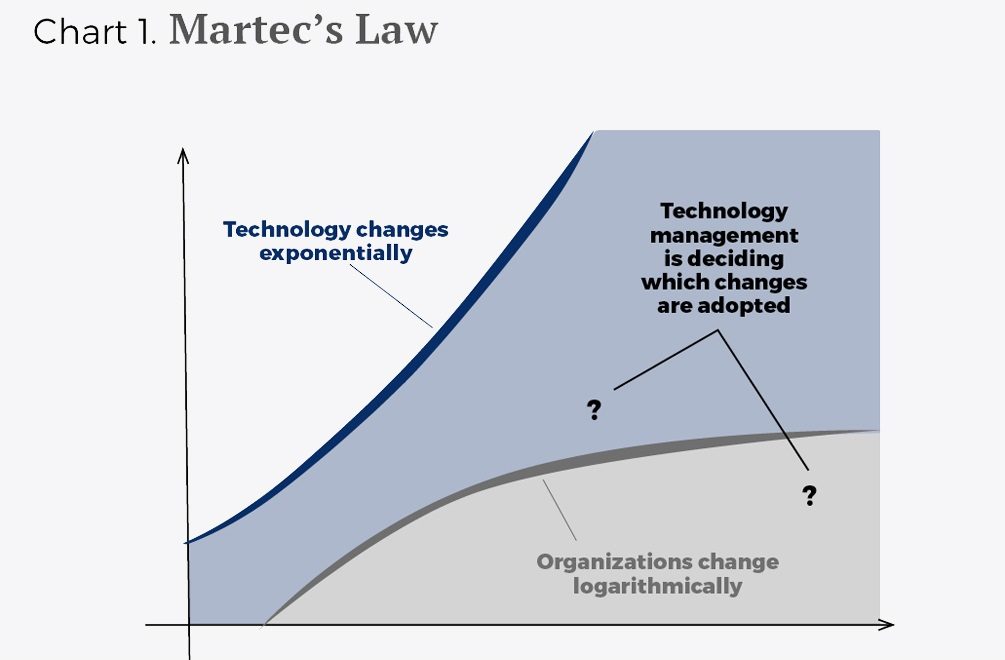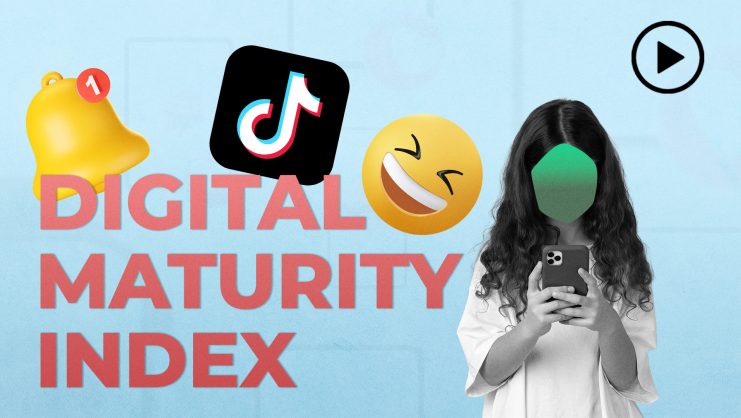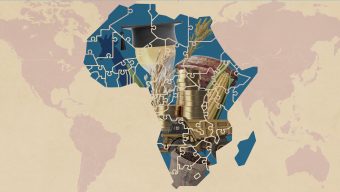The concept of digital transformation is a concept born of fear. It might just as well be called “a natural evolution of competitive capabilities in an environment in which digital has become paramount.” The truth is that in today’s environment, users choose how to communicate, how to search; we live under the tyranny of the keyword. To paraphrase my friend David Sanfelipe, SEO killed the lyrical.
In fact, the present is just another step in the evolutionary process. We refer to it as a “transformation” only because users organically adopted the technology before companies, and it is thus companies that must now accept this change and transform. Even as the traditional seems to have taken on negative connotations, it still accounts for 80% of most companies’ bottom line. Technology is evolving far faster than organizational change or the skills and competencies of most professionals (see Chart 1).
Source: Scott Brinker, Martec’s Law: Technology changes exponentially, organizations change logarithmically.
In this new context, who will lead the digital transformation? Younger professionals naturally adapted to the new technological environment or perhaps those professionals able to embrace digital and integrate it into their extensive strategic knowledge of their specific industry? Digital transformation is not just an exercise in technology; there are more vectors. And experience and strategic skills are decisive for today’s professional.
The Context: A New Environment Full of Paradoxes
The new reality we are experiencing is shaped by multiple paradoxes. Let’s begin with just one. In 1996, Bill Gates said, “Content is where I expect much of the real money will be made on the Internet, just as it was in broadcasting.” And so it is. Who would have said, ten or fifteen years ago, that Telefónica or Vodafone’s business would be largely content-oriented today? It was unthinkable: they were telecoms, and their business was based on connecting users, on communication. Today, their focus is content. Indeed, much of the investment of most companies today is geared toward creating more and more content, in an environment in which, curiously, attention spans are shrinking. Therein lies the paradox.
In 2008, Nicholas Carr published an article in The Atlantic entitled “Is Google Making Us Stupid? What the Internet Is Doing to Our Brains.” In it, he basically postulated that we have lost our ability to focus. We live in a society that does not read and is unable to retain content, to home in and pay attention. And our attention spans are dwindling precisely at a point in human history in which we have access to more information than ever before.
In their 1998 foundational paper on Google, “The Anatomy of a Large-Scale Hypertextual Web Search Engine,” Sergey Brin and Larry Page laid the foundations for their search engine and introduced the challenge of scalability. In their view, the challenge lay in scaling from the first search engine, built in 1994 and able to index more than 110,000 web pages, to one that, according to their predictions at the time, would be able to process hundreds of millions of queries per day by 2000. In fact, Google currently processes more than 3.5 billion queries a day, more than 40,000 per second (source: Internet Live Stats, February 2017). Are human beings prepared to become more discerning, even as we become increasingly accustomed to processing headlines of 140 characters or less?
The rules of the game are changing, and anyone seeking to lead this area of transformation must know how to manage uncertainty.
The Challenge for Today’s Leaders: VUCA, Uncertainty Is Here to Stay
The world seems to be evolving at a dizzying speed. And, yes, we live in an increasingly complex environment, an environment in which uncertainty is the new norm and the rules of the game are less and less clear. The well-known acronym VUCA (Volatility, Uncertainty, Complexity, and Ambiguity) describes this new environment perfectly.
The truth is that we are trying to use Newtonian logic to explain a reality that no longer follows a linear logic, but a much more complex (perhaps quantum) one. Users may no longer be making their purchase decisions based on traditional media, and information may be more fragmented than ever: it is a world with more information and more accessibility, but less discernment.
The rules of the game are changing, and anyone seeking to lead this area of transformation must know how to manage uncertainty. For decades, professionals have been trained to control and manage risk, to minimize it, and to make good decisions. Today, it is just the opposite: companies need professionals who are able to accept and manage uncertainty and, moreover, conceive of models in environments in which historical series no longer work. The new professional must not only have digital skills, but also be prepared to integrate a new set of soft skills. It is those skills that will make the difference, because volatility, uncertainty, complexity, and ambiguity are here to stay.
We are talking about a new kind of professional, one who begins by accepting the environment but is also prepared to envision a possible future and implement and iterate a plan, learning through trial and error. Digital skills and soft skills. Visionaries and excellent managers. These are the ingredients of the new leader.
© IE Insights.












